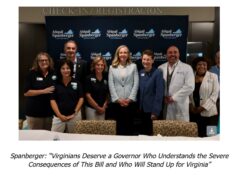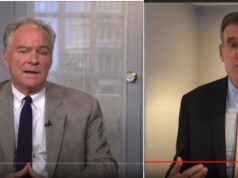by Anthony Flaccavento – Abingdon, VA
Toay, the Rural Urban Bridge Initiative and the Progressive Democrats of America are jointly releasing a Rural New Deal, a policy template for federal action that will support bottom-up, community driven solutions to rural America’s problems. As one of the authors of the Rural New Deal, I am grateful that Alan Minsky, the Director of Progressive Democrats of America came to RUBI with a straightforward request: Help us, progressive Democrats, understand rural people; help us make their needs and priorities ours. Because that’s what progressives should do.
In nearly 40 years of rural development work in southwest Virginia and around the country, this was the first time I’d ever known a national progressive leader to reach out like this. I was thrilled.
Local leaders across southwest and southside Virginia have been working for years to regenerate their communities, revitalizing traditional occupations while embracing new businesses and new economic strategies. Local innovators in small towns across the country are forging effective solutions to everything from the opioid epidemic to the affordable housing crisis. Yet all of this is an enormous challenge, especially when you’ve been almost completely overlooked by politicians and pundits for decades. Far too many of our national leaders – including some Democrats – have bought into the myth of trickle-down economics, investor-driven trade agreements and a free pass for corporations who shutter factories, drive up land prices through speculation and squeeze family farmers and small businesses.
To say this has hurt rural communities and most workers is an understatement. Let’s call it what it is: A suck-up economy that drains wealth from everyday people, undermines workers and unions and treats rural places like a resource colony.
But there’s good news: The Biden Administration has taken substantial steps to reverse 40 years of disastrous neoliberal policies through major investments in infrastructure, food and agriculture, rural broadband and American manufacturing. What’s more, Biden’s aggressive anti-trust actions on multiple fronts have begun to reverse the tide of corporate concentration in every part of American life. And the recent changes enacted by the National Labor Relations Board will help ensure that workers can no longer be intimidated or stalled in their quests to unionize. While they’ve made some mistakes, Joe Biden is proving to be the most pro-worker, pro-farmer and pro-rural president of the past 40 years.
That’s where the Rural New Deal comes in. Building on historic investments now hitting the ground, the Rural New Deal will accelerate the process of revitalizing rural communities, while contributing to the overall health and resilience of the American economy. A concise but relatively detailed platform for federal action, the Rural New Deal puts workers and good jobs at the center, dramatically expands critical rural infrastructure, levels the playing field for family farms and small businesses against absentee corporations, and address a myriad of health, housing and other problems with locally tailored solutions. Rather than imposing a top down, “cookie cutter” approach, the Rural New Deal encourages bottom-up approaches to strengthening rural America. Perhaps that’s why 350.org founder, Bill McKibben has called it “a remarkable document.”
The Rural New Deal has ten pillars each of which contains five to eight recommendations for public policy, primarily at the federal level. While rural-driven and rural-focused, many of the recommendations would benefit people in cities and suburbs as well. As an example, the second pillar, “Reward Work and Ensure Living Wages” calls for a federal jobs guarantee with livable wages, expansion of effective training and apprenticeships for displaced workers, eliminating unfair barriers to unionization, and support to small businesses who struggle to pay fair wages. The third pillar, “Dismantle Monopolies, Empower and Support Local Business” dives deeper into support for independent businesses, including cooperatives while squarely tackling extreme corporate concentration through aggressive anti-trust action, reduction of corporate subsidies and challenges to the unbridled power of private equity.
While the Rural New Deal is a non-partisan call to action, one which could be embraced across the political spectrum, it is rooted in a progressive economic vision. According to PDA Director, Alan Minsky, “Addressing the problems and concerns of rural America, isn’t just the right thing to do, it is essential for the health of our nation. Too many Progressives have ignored rural and small-town America for too long. The Rural New Deal will change that.”
Some will argue that we can’t afford the investments proposed in the Rural New Deal, or that the federal government should not be “picking winners” by supporting small businesses, clean energy providers or family farmers. We don’t buy it. The United States currently has 756 billionaires with an estimated collective net worth of $4.5 trillion. If we include U.S. millionaires, this tiny slice of our population holds over $190 trillion of wealth. The federal government has been picking winners for decades, and most of them are among that group.
Mike Schmuhl, Chair of the Indiana Democratic Party is one of a growing list of progressive and Democratic leaders to endorse the Rural New Deal. As Mike has put it, “The growing divide between rural and urban communities in our country is crippling our politics and darkening how Americans feel about one another. This divide is linked to many factors and has led to a lack of belonging for many people and policies that sometimes don’t always translate or improve someone’s life.
While we can’t rewrite the past, we can reframe the future. A policy framework like the Rural New Deal would recenter our policy debates to people and local communities, cut through the political noise, build understanding and trust, and put us all on a path for a real American renewal.” And we say Amen to that!
*****************************
Anthony Flaccavento is a farmer and rural development consultant from Abingdon, VA, and the Executive Director of RUBI, the Rural Urban Bridge Initiative. He was the 9th District Democratic Candidate for Congress in 2018.













